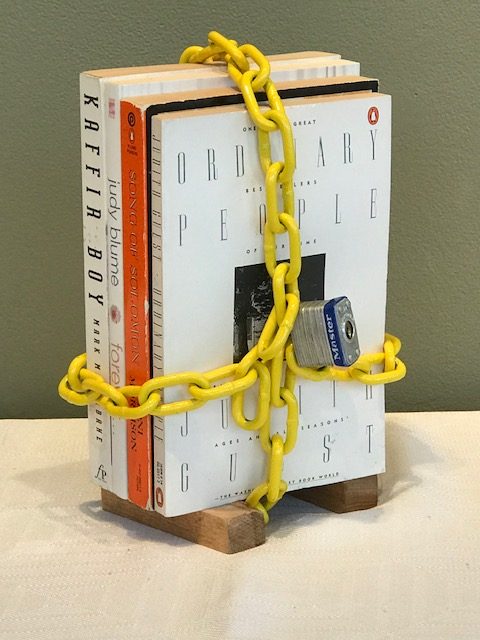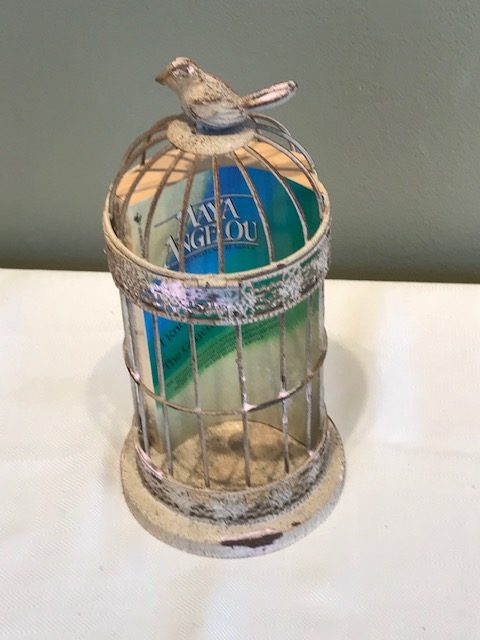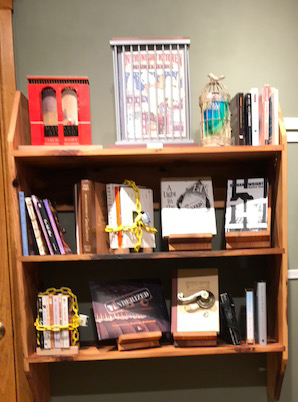
Locked away are ideas from Ordinary People, Song of Solomon, Forever, and Kaffir Boy.
Maya Angelou’s I Know Why the Caged Bird Sings is captured and squeezed into a tiny bird cage. Margaret Atwood’s The Handmaiden’s Tale is hidden behind brick walls. George Orwell’s 1984 has been “tenderized” and stamped on every page with “Big Brother is watching.” Other books are chained and padlocked.
These are all elements of Summer Reading, an homage to the terrible things we do to ideas, created by Minnesota artist George Roberts, founder of Homewood Studios. He has taken challenged and/or banned books from the American Library Association’s most challenged book lists—and treated them abysmally. He’s obliterated words, encased them in plastic, glued pages together so we can’t get to them. He’s been the mother of all censors. To make a point. That for a people who profess to honor and welcome the ideas of all, we spend an inordinate amount of time and energy hating the ideas of others.
And look where it has gotten us. Insurrectionists have stormed the legislative halls that once were treated with respect and reverence. Public meetings have become shouting matches and brawls. Families are rent asunder or duct taped into silence at dinner tables.
For this work of art, Roberts selected books that he had taught as a high school literature teacher in north Minneapolis. “I found the ALA’s list especially repugnant because I felt strongly those books would connect with young people,” Roberts said. “And they did connect in my classes. I used great—albeit controversial—writing to show young people how to hold strong opinions, support and defend those opinions with substantive examples, listen to others holding opposing views with equal passion, and remain respectful throughout.”

I Know Why the Caged Bird Sings, Maya Angelou’s autobiographical novel, was published in 1969 and continues to be one of the most banned books in America.
But it is so difficult to “remain respectful throughout” in polarized times and so bad for our country when we fail to do so. We can’t make any progress if we can’t talk to each other, if we can’t exchange ideas without taking each other’s heads off.
Summer Reading is not just about censorship, and censorship is not just about controlling what people read. It is about fear and power. Censorship, whether done in a library or at the dinner table, stifles growth and love. It makes our world smaller and us smaller. The haters of ideas want a smaller world because it is easier to control.
Democracy is not supposed to be easy to control. It’s wild and messy. It should be. Because only when there is this tug of war, these checks and balances, this soup of ideas, that we avoid tyranny. Some people are like frogs, they don’t recognize that they are in the boiling water of tyranny until it’s too late. Then, when they try to jump out of the pot to no avail, they cry, “Wait a minute. Where did all my national parks go? Why is the air polluted and the water undrinkable? Why are we separating immigrant children from their parents and refusing to give them toothbrushes and soap? What happened to my neighbor who was from a foreign land but still a likeable fellow who paid his taxes and mowed his lawn?”
Jennifer Rubin of The Washington Post notes that “stewing in the nonsensical arguments and conspiracy theories gushing from Fox News, proudly adopting know-nothingism (e.g. climate change denial), and repudiating legitimate journalism and scholarly expertise come with a price. The mind atrophies; the ability to discern what is absurd from what is persuasive falters.”

More ideas in danger by artist George Roberts.
In other words, if we only allow those we agree with to speak, we lose the ability to learn and make decisions for ourselves. We lose our freedom. We also lose our compassion. We become a mean society as evidenced by the uncivility we see everywhere, from campaign rallies to social media to government chambers.
The ALA’s Office for Intellectual Freedom tracked 377 challenges in 2019. That means more than once a day someone entered a library in America and demanded that a book be removed because they didn’t agree with its ideas—and therefore, no one should be able to read it.
Censorship is unconstitutional. The US. Supreme Court has ruled that the Constitution “protects the right to receive information and ideas.” When we deny others access to information, whether it be in a local library or a US government website, that is censorship. When we shame or intimidate others into silence, that is censorship. When our elected leaders refuse, out of partisanship, to even allow a discussion on bills that will help all Americans, that is censorship.
What can we do?
Call out censorships in all its ugly forms. Fight for literacy and learning, in the face of despotic closed minds. But most of all, be respectful of all opinions, not just our own. It is the only way to keep us from being caged birds in America.
__________________________
George Roberts is my talented brother-in-law and the owner of Homewood Studios in North Minneapolis. There are plans to display his piece, Summer Reading, in Hennepin County’s Summer Library in the near future.
For more reading on censorship and book banning, please check out Book of Mercy. This novel was inspired by book banning events in a North Carolina school (see “Mom, They’re Banning Books“).





